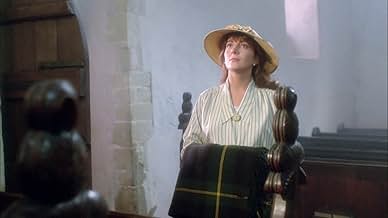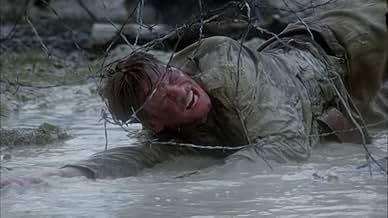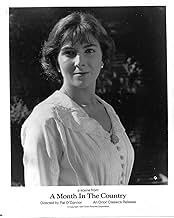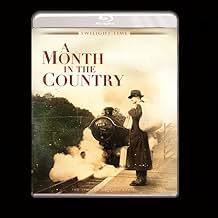IMDb रेटिंग
6.8/10
2.1 हज़ार
आपकी रेटिंग
अपनी भाषा में प्लॉट जोड़ेंTwo soldiers (Colin Firth, Kenneth Branagh) recover from World War I while spending a summer in a Yorkshire village.Two soldiers (Colin Firth, Kenneth Branagh) recover from World War I while spending a summer in a Yorkshire village.Two soldiers (Colin Firth, Kenneth Branagh) recover from World War I while spending a summer in a Yorkshire village.
- पुरस्कार
- 1 जीत और कुल 1 नामांकन
Ken Kitson
- Mr. Sykes
- (as Kenneth Kitson)
फ़ीचर्ड समीक्षाएं
I saw this film probably 15 years ago, and have never forgotten it. It's about two World War I soldiers who are recuperating at a church. The one is trying to find the remains of the local priest - it's been a while so my brain's a bit rusty - and the other is revealing a mural on the church wall. There's also a love story/triangle to it. It is fabulously acted and demonstrates the horrors faced by men during war time. Kenneth Branagh's performance is worth the price of rental alone. Colin Firth manages to act for a change, rather than seem like he's sleepwalking. (Check out Apartment Zero, another older and decent film.) Exceptional!
13. A MONTH IN THE COUNTRY (drama, 1987) Birkin, a young WW1 veteran, arrives in the sleepy town of Oxgodby assigned to paint the church. He suffers from nightmares since being shell-shocked. Birkin meets the beautiful Alice (Natasha Richardson), the wife of the local pastor. Though they're immediately attracted to each other, they know they can't be together. But his love for Alice proves a happy respite from his war ravanged life.
Critique: To doze off in a sleepy afternoon watching 'A Month in the Country' feels almost like being there. This beautifully shot, nostalgic look at youth's lost moments, conjures up deeply felt emotions. The town of Oxgodby seems to exist between reality and fantasy. Slowly slumbering away in its own ambiance, unaware of the world around it. Where dreamers go, and weary travelers stumble on their way.
Pat O'Connor's doughty direction may get a bit tedious at times, but it has to be taken in the context of the film's setting (1920s England). Though some scenes do lag in pace, this does not take anything away from the film's dreamy (dark) undertones which are its strong points.
Character conflict is its weakest, however, since most of the characters react passively to the town's underhand prejudice. The best enduring quality is Birkin's lost-love relationship with both the town and Alice.
QUOTE: "God? What God? There is no God?"
Critique: To doze off in a sleepy afternoon watching 'A Month in the Country' feels almost like being there. This beautifully shot, nostalgic look at youth's lost moments, conjures up deeply felt emotions. The town of Oxgodby seems to exist between reality and fantasy. Slowly slumbering away in its own ambiance, unaware of the world around it. Where dreamers go, and weary travelers stumble on their way.
Pat O'Connor's doughty direction may get a bit tedious at times, but it has to be taken in the context of the film's setting (1920s England). Though some scenes do lag in pace, this does not take anything away from the film's dreamy (dark) undertones which are its strong points.
Character conflict is its weakest, however, since most of the characters react passively to the town's underhand prejudice. The best enduring quality is Birkin's lost-love relationship with both the town and Alice.
QUOTE: "God? What God? There is no God?"
When an arm or leg is removed, the amputee can continue to 'feel' it for some time afterwards. The phantom limb can hurt, or itch, or feel cold. But nothing is truly the same.
Similarly, the First World War irrevocably altered Britain, but in its immediate aftermath we limped on, unaware (or unwilling to admit) that anything had changed. It's this brief period of denial that Month in the Country illustrates: the moment when we teetered on the edge of the 19th century before toppling into the 20th.
Consequently, while it is a film of great heartbreak and loss, it is also one of great hope and triumph of the human spirit. There is one scene that perfectly illustrates this: a little girl visits her friend, who is sick in bed. She talks about the weather and her new hat and how they'll play together when her friend gets well. Then as she walks back home she says to Colin Firth
'She knows she's dying, doesn't she?'
It is as tragic for the girl to be so knowing and capable in the face of death as it is for young men to have experienced the hell of the trenches and return to indifference and hostility. But because of that tragedy they will go on to experience a more real, and potentially more joyful world, than the other inhabitants of comfortable and conventional Oxgodby.
Similarly, the First World War irrevocably altered Britain, but in its immediate aftermath we limped on, unaware (or unwilling to admit) that anything had changed. It's this brief period of denial that Month in the Country illustrates: the moment when we teetered on the edge of the 19th century before toppling into the 20th.
Consequently, while it is a film of great heartbreak and loss, it is also one of great hope and triumph of the human spirit. There is one scene that perfectly illustrates this: a little girl visits her friend, who is sick in bed. She talks about the weather and her new hat and how they'll play together when her friend gets well. Then as she walks back home she says to Colin Firth
'She knows she's dying, doesn't she?'
It is as tragic for the girl to be so knowing and capable in the face of death as it is for young men to have experienced the hell of the trenches and return to indifference and hostility. But because of that tragedy they will go on to experience a more real, and potentially more joyful world, than the other inhabitants of comfortable and conventional Oxgodby.
I adored the book by J. L. Carr, and was skeptical that Birkin's first person narrative could be conveyed on film. Firth brilliantly makes this internal landscape manifest, while the film provides a sumptuous external setting. All the lead cast strike an effective balance between intensity and restraint. Every time I view the movie, I see things that I hadn't noticed before.
I wish I had seen "A Month in the Country" on the big screen when it was released. The laserdisc looks good, though I wonder what I'm missing. Even though the laserdisc soundtrack is monophonic, it was striking enough to make a friend jump when we were viewed it.
I wish I had seen "A Month in the Country" on the big screen when it was released. The laserdisc looks good, though I wonder what I'm missing. Even though the laserdisc soundtrack is monophonic, it was striking enough to make a friend jump when we were viewed it.
I think this is the most-watched movie in my collection. Its strong passions are beautifully understated by the entire ensemble, which is the thing that I appreciate most in this film. All the cast are excellent, including the children (and I must add a special appreciation for Jim Carter, who has played opposite Firth in at least two other films that I know of), but this is an absolute tour de force for both Colin Firth and Kenneth Branagh. The viewer seems to share the pain and humiliation borne by the sufferers of "shell shock". Their encounters with the joy and grief inherent in the life and people of a small Yorkshire village are both poignant and humorous.
The slow pace enriches the character development and story. It mirrors the patient process of both leading characters' pursuits: Firth's character uncovers a medieval church mural slowly and carefully, as Branagh's seeks and uncovers a mysterious grave. Both work with an audience of curious local villagers by day, and wrestle with their personal demons by night. Slowly new bittersweet relationships develop as the summer progresses. I pity the impatient of this world who can't focus their attention long enough to take in or appreciate the rich content of the performances, the subtle direction, the beauty of both the cinematography and the music.
This movie is a gentle and uplifting experience each time it is viewed! A movie to be savored. I highly recommend it!
The slow pace enriches the character development and story. It mirrors the patient process of both leading characters' pursuits: Firth's character uncovers a medieval church mural slowly and carefully, as Branagh's seeks and uncovers a mysterious grave. Both work with an audience of curious local villagers by day, and wrestle with their personal demons by night. Slowly new bittersweet relationships develop as the summer progresses. I pity the impatient of this world who can't focus their attention long enough to take in or appreciate the rich content of the performances, the subtle direction, the beauty of both the cinematography and the music.
This movie is a gentle and uplifting experience each time it is viewed! A movie to be savored. I highly recommend it!
क्या आपको पता है
- ट्रिवियाPart of the movie is slightly out of focus. This is not due to its age or careless restoration, nor is it intentional. Director Pat O'Connor says in an interview included in the BFI Blu-ray/DVD edition released in 2016 that he was furious about it at the time.
- गूफ़According to Alice Keach, her roses are the variety Sarah Van Fleet. However, the film is set in 1920 and Sarah Van Fleet roses were not introduced until 1926.
- भाव
Reverend Keach: Where do you intend to stay?
Birkin: Well, I thought, um... here.
Reverend Keach: Here? Where here?
Birkin: What about the belfry?
Reverend Keach: The belfry? I can't say that appeals to me, having somebody stay in the belfry. Shouldn't you take lodgings? A room in teh Shepherd's Arms?
टॉप पसंद
रेटिंग देने के लिए साइन-इन करें और वैयक्तिकृत सुझावों के लिए वॉचलिस्ट करें
- How long is A Month in the Country?Alexa द्वारा संचालित
विवरण
बॉक्स ऑफ़िस
- US और कनाडा में सकल
- $4,43,524
इस पेज में योगदान दें
किसी बदलाव का सुझाव दें या अनुपलब्ध कॉन्टेंट जोड़ें































